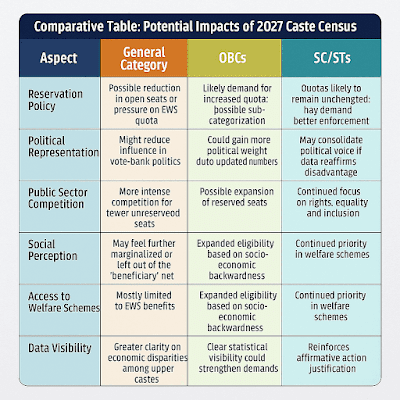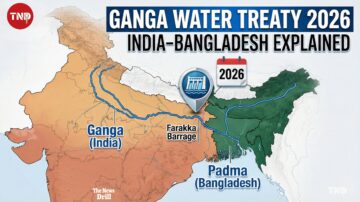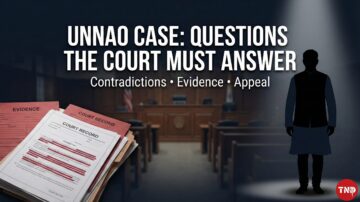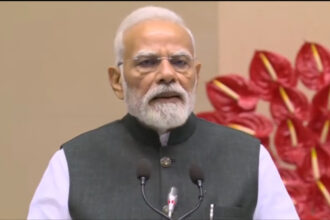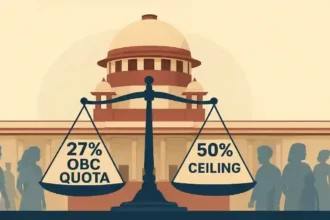The inclusion of caste enumeration in the 2027 Population Census could have significant social, economic, and political implications for all groups, including the General category (also referred to as “unreserved category” or “open category“). Below are key potential implications for General category individuals:
- Implications for General Category People in India Due to Caste Census 2027
- 1. Possible Recalibration of Reservation Policies
- 2. EWS (Economically Weaker Section) Quota Reassessment
- 3. Intensified Political Marginalization
- 4. Increased Social and Competitive Pressure
- 5. Demand for Sub-Categorization Within the General Category
- 6. Societal Tensions and Perception of Injustice
- 7. Long-term Opportunities for Reform
- 🎯 Strategic Suggestions for General Category Individuals
Implications for General Category People in India Due to Caste Census 2027
1. Possible Recalibration of Reservation Policies
- Data-driven redistribution of quotas: With updated and accurate caste data, the government may revise the existing reservation system. If it is found that some backward castes have increased in population or remain highly underrepresented in key sectors, they may be allocated a larger share of reservations.
- This could potentially reduce the proportion of open seats available to the General category in jobs, education, and government institutions.
2. EWS (Economically Weaker Section) Quota Reassessment
- The 10% EWS reservation (introduced in 2019) for economically disadvantaged individuals from the General category is not based on caste but income and asset limits.
- A caste census could trigger a reassessment of the EWS quota, possibly prompting debates on its justification and scope if new caste-based disparities are revealed.
3. Intensified Political Marginalization
- Political parties may increasingly shift their focus toward numerically large caste groups, including OBCs and other backward communities, based on the census data.
- This could result in the General category, especially upper-caste groups, losing political influence or representation in certain regions or sectors.
4. Increased Social and Competitive Pressure
- If the caste census leads to an expansion of reservations or benefits to more castes under the “backward” umbrella, General category individuals may face increased competition for limited unreserved seats.
- This may exacerbate feelings of economic anxiety, social exclusion, or identity-based insecurity.
5. Demand for Sub-Categorization Within the General Category
- There might be internal divisions within the General category, leading to demands for finer sub-categorization, especially among the economically weaker or socially marginalized among upper castes.
6. Societal Tensions and Perception of Injustice
- If the census data leads to policies perceived as unfair or overly caste-favoring, it may deepen resentment or social divisions, particularly between the reserved and unreserved sections.
- This could lead to civil society debates, legal challenges, and possible protests.
7. Long-term Opportunities for Reform
- On a more constructive note, the caste census could eventually pave the way for a more rational, evidence-based reservation policy—possibly including economic criteria more explicitly, which might benefit poor individuals in the General category.
- It may also open up space for alternate modes of support (scholarships, skill development, job opportunities) based on economic need rather than caste alone.
🎯 Strategic Suggestions for General Category Individuals
1. Focus on EWS Quota Optimization
- Stay updated on income and asset limits.
- Gather proper documentation early (income certificate, asset declaration, etc.).
- Track state-level EWS policies, as rules may vary.
2. Strengthen Merit-based Competitive Edge
- Prioritize skill development, digital literacy, and analytical ability.
- Prepare for exams with less reservation impact (like UPSC prelims, SSC Tier I, state-level prelims).
3. Diversify Career Opportunities
- Look at private sector, entrepreneurship, and global opportunities that are not influenced by reservation policies.
- Consider foreign scholarships or fellowships that support merit or economic need.
4. Form Support Networks
- Join or form study groups, mentorship platforms, and forums that support General/EWS aspirants.
- Engage with legal literacy initiatives to understand and protect your rights.
5. Advocate for Economic Criteria in Policy
- Support movements and legal petitions that push for economic-based affirmative action.
- Participate in civil discourse on data transparency and policy rationalization.
6. Stay Resilient and Adaptive
- Accept that policy landscapes change; adapt strategies with a long-term view.
- Focus on continuous learning, mental health, and goal alignment.
Conclusion:
While the caste census of 2027 aims to promote equity and data-driven governance, it brings a mix of challenges and opportunities for the General category. The outcome will depend on how the data is used—whether it leads to inclusive policy reforms or deepens existing divides. General category individuals may need to adapt to an evolving socio-political landscape and advocate for economic justice and merit-based opportunities within a fair framework.
| Aspect | General Category | OBCs | SC/STs |
|---|---|---|---|
| Reservation Policy | Possible reduction in open seats or pressure on EWS quota | Likely demand for increased quota; possible sub-categorization | Quotas likely to remain unchanged; may demand better enforcement |
| Political Representation | Might reduce influence in vote-bank politics | Could gain more political weight due to updated numbers | May consolidate political voice if data reaffirms disadvantage |
| Public Sector Competition | More intense competition for fewer unreserved seats | Possible expansion of reserved seats | Continued focus on rights, equality and inclusion |
| Social Perception | May feel further marginalized or left out of the ‘beneficiary’ net | Expanded eligibility based on socio-economic backwardness | Continued priority in welfare schemes |
| Access to Welfare Schemes | Mostly limited to EWS benefits | Expanded eligibility based on socio-economic backwardness | Continued priority in welfare schemes |
| Data Visibility | Greater clarity on economic disparities among upper castes | Clear statistical visibility could strengthen demands | Reinforces affirmative action justification |


